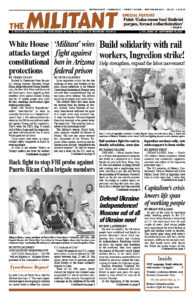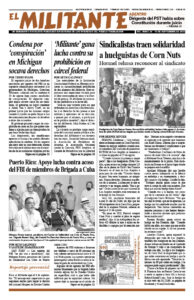In an important victory for the free exchange of ideas and freedom of the press, prison authorities at the Federal Correctional Institution in Phoenix have reversed their unconstitutional ban on two issues of the Militant. The Militant has resent the papers to its reader there.
The Militant didn’t first learn about the reversal from the Bureau of Prisons. Instead, Justin Mazzola of Amnesty International informed the paper of a cryptic email reply received Aug. 31 from the bureau’s Western Regional Executive Assistant to his protest letter. The email said, “The issue has been resolved at the institutional level.”
The Militant’s lawyer, David Goldstein, promptly emailed the Bureau of Prisons. The next day senior attorney Eric Hammond of the Western Regional Office replied, clarifying that the banned issues are now “permitted to the intended recipient.” He said the bureau had sent a letter via the U.S. mail informing the Militant of the reversal. As of Sept. 5 the letter has yet to arrive.
“This is a victory for all those who defend constitutional rights and the right of prisoners to read news and opinions of their choosing, to think for themselves, to be participants in world politics,” said Militant editor John Studer Sept. 2. “It can be used to aid other publications fighting similar bans around the country.”
The victory came as a result of growing public support for the rights of the Militant and its readers behind bars. In addition to Amnesty International, others sending letters to the Bureau of Prisons included the Arizona Newspapers Association, National Association Against Censorship, PEN America, Reporters Committee for Freedom of the Press, retired Howard University professor John Cotman, and a group of workers from the Bimbo bakery factory in Grand Prairie, Texas.
“Great news!” Anthony Johnson of PEN America wrote the Militant upon hearing about the overturn of the ban.
“The Militant is such an important publication, especially for those of its subscribers who are incarcerated,” wrote Elizabeth Larison, from the National Coalition Against Censorship.
The American Civil Liberties Union and the ACLU of Arizona wrote they are “pleased the Militant’s appeal was successful.” They were about to send a joint letter of protest when the victory was announced. Jared Keenan, ACLU of Arizona legal director, added, “Individuals have a constitutional right to receive information while incarcerated” and publishers “have a right to communicate with incarcerated individuals.”
The ACLU is in the middle of a battle with Arizona Department of Corrections officials who have suppressed at least five issues of the Nation magazine in state prisons there over the last year, falsely claiming it promotes racial superiority or contained sexual content. The bans violate the First Amendment rights of prisoners and the Nation, the ACLU said.
The ban on the Militant at the federal prison in Phoenix was in violation of the Bureau of Prison’s own rules. The only reason given by prison authorities was an unsubstantiated claim that the Militant promotes “political extremism.” The rules state explicitly that a publication may not be rejected “solely because its content is religious, philosophical, political, social or sexual, or because its content is unpopular or repugnant.”
And, the rules add that the rejection “notice must contain reference to the specific articles(s) or material(s) considered objectionable.”
But the warden didn’t cite a single word in the paper. And issue no. 25 was returned to the Militant without any notice or explanation at all.
The front page of no. 23 features an article opposing Moscow’s invasion of Ukraine and another titled “Gun violence, crime are result of today’s crisis of capitalism.” Inside is a feature explaining the importance of opposing antisemitism. There is also coverage of the 16-month-long strike by members of the United Mine Workers in Alabama against Warrior Met Coal, and other labor battles.
Goldstein noted that it would be “difficult to find a clearer admission of censorship based on objection to the political content of the Militant than Phoenix’s admission” the ban was based on “political extremism.”
For at least 60 years the Militant’s subscribers in prison have been able to read the paper with little interference from prison authorities. The Militant has more than 170 prisoner subscribers in 25 states, in local prisons, state prisons, and over a dozen federal facilities.
“Supporters of the Militant should use this victory to get the paper into the hands of more workers behind bars,” said Studer. “Let family and friends who are incarcerated know that they can get a low-cost or free subscription to the Militant. Contribute to the Militant’s Prisoner Fund to make that possible.”

